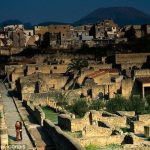In 2015 scientists believed that they have found a way to learn about the contents of the only ancient library that has survived to our times. The library is located in a villa in Herculaneum, a city that in 79 CE was destroyed by the eruption of Mount Vesuvius.
The de facto hot gases and ash allowed Roman documents to survive in a great villa that could have belonged to Lucius Calpurnius Piso Caesoninus, father-in-law of Julius Caesar. Even though the gases did not burn the papyri, they turned them into rolls of charred cloth. Since the discovery was made in 1752, many attempts have been made to unfold the scrolls. Most of them, however, are very sensitive and damaged under pressure. Therefore, scientists decided to leave the valuable monuments alone, believing that there would be a method to read the ancient writings.
In recent days, scientists led by Vito Mocella (the Institute of Microelectronics and Microsystems in Naples) for the first time found that they were able to read the contents of the scrolls without unfolding them. For this purpose, they want to use a beam of X-rays, which will allow them to obtain the appropriate contrast and slightly distinguish the ink on the charred material. As they claim, they have already managed to select some Greek letters and are sure that the new technology will allow them to learn the content of most of the scrolls (there are over 300), including perhaps the lost books of Livy’s great work “Ab urbe condita”.







